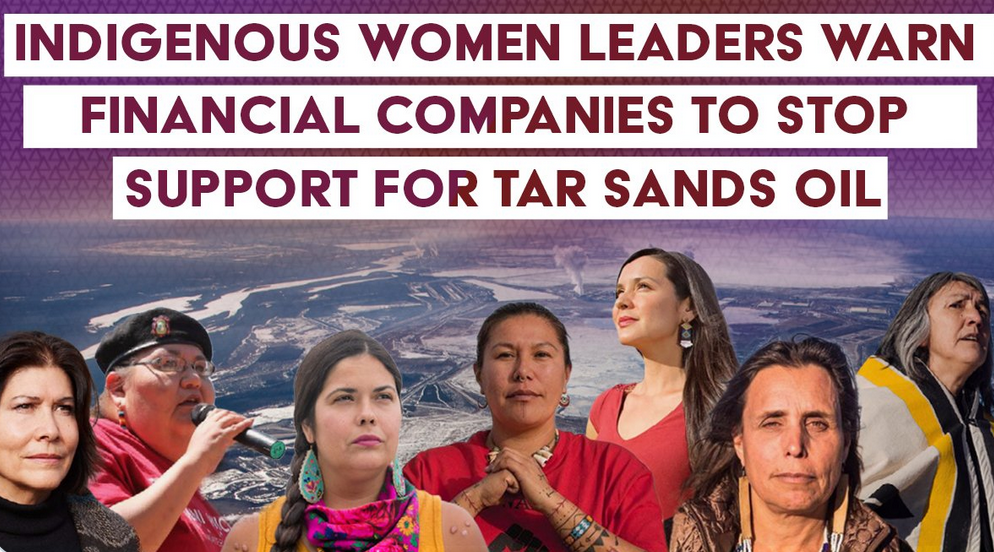Indigenous women leaders sent an open letter to 70 major financial institutions calling on them to respect Indigenous rights & stop financial support to the #TarSands industry.
October 19, 2020, over 40 Indigenous women from communities impacted by tar sands sent an open letter to 70 major banks, insurers, and asset managers, calling on them to respect Indigenous rights and stop providing financial support for the industry destroying their homelands.
In a letter addressed to the CEOs of these global financial institutions, the women wrote: “With fossil fuel corporations plowing ahead with pipeline construction in the midst of a global pandemic and massive financial meltdown, we urge your institutions to immediately decline any additional support for TC Energy’s Keystone XL pipeline, Enbridge’s Line 3 pipeline, and the Canadian government’s Trans Mountain pipeline — and to cut ties with all tar sands projects and companies.”
The letter outlines the many risks and impacts that the fossil fuel industry, specifically tar sands, has caused in their communities. Construction for these pipeline expansion projects puts rural Indigenous communities at a higher risk for COVID exposure and sexual violence. The tar sands industry has devastated the northern communities through mining, extraction and refining.
There is a growing movement of financial institutions exiting the tar sands sector. To date, more than twenty major banks have policies limiting tar sands financing, and nine insurers have restricted insurance for the sector, including two U.S. companies. Norway’s Norges Bank – the world’s largest sovereign wealth fund – divested from four of the largest Canadian tar sands companies, citing their “unacceptable” level of greenhouse gas emissions.
This spring, the tar sands industry hit an all time low, producing barrels of oil at a loss. The signatories call on the finance industry to accelerate a just transition toward renewable, regenerative energy and away from this destructive fossil fuel for the sake of Indigenous Nations, women, communities, and workers that depend on the industry for their livelihoods.
The original signatories for the letter include: Tara Houska (Couchiching First Nation), Giniw Collective; Rebecca Adamson (Cherokee), Founder, First Nations and First Peoples Worldwide; Joye Braun (Cheyenne River Sioux), Indigenous Environmental Network; Freda Huson (Unist’ot’en), Unist’ot’en Healing Centre; Winona LaDuke (White Earth Nation), Honor the Earth; Kanahus Manuel (Secwepemc), Tiny House Warriors; Eriel Tchekwie Deranger (Athabasca Chipewyan First Nation), Indigenous Climate Action.
Here’s the first part of the letter (to see the full letter go HERE):
October 19, 2020
To the CEOs of major global asset managers, banks, and insurers:
We, the undersigned group of Indigenous women and organizations, call on your institutions to stop financing, investing in, and insuring the expansion of tar sands oil extraction, transport, and refining, and commit to phasing out support for tar sands oil. These measures should encompass both projects and the companies that build and operate such projects.
The tar sands sector poses grave threats to Indigenous rights, cultural survival, local waterways and environments, the global climate, and public health. Furthermore, this year saw a significant set of losses in the oil and petroleum sector, and none has had a worse financial prognosis than the tar sands oil.
The destructiveness of tar sands has been well-documented, and the sector’s growth has been inhibited by legal challenges, financial uncertainty, and grassroots resistance. Though governments and corporations are still calling for the expansion of the tar sands, current tar sands production is restricted by a pipeline bottleneck, which means that the future of increased tar sands extraction depends on three pipelines.
With fossil fuel corporations plowing ahead with pipeline construction in the midst of a global pandemic and massive financial meltdown, we urge your institutions toimmediately decline any additional support for TC Energy’s Keystone XL pipeline, Enbridge’s Line 3 pipeline, and the Canadian government’s Trans Mountain pipeline –and to cut ties with all tar sands projects and companies.
At this moment, tar sands extraction and construction poses major risks to the health of communities and workers due to COVID-19 transmission. There have been reported outbreaks of the virus at tar sands project sites in Alberta.1Meanwhile, construction has recently started or is continuing on the Keystone XL pipeline in Montana, the Line 3 pipeline in Minnesota and the Trans Mountain pipeline in British Columbia. Tribal leaders, local lawmakers, and residents have warned that a mass influx of workers from outside their region could spread COVID-19 in rural areas that lack adequate medical infrastructure to handlea surge in virus cases.
Indigenous peoples across the U.S. are already experiencing the devastating impact of the COVID-19 pandemic. These communities are uniquely vulnerable to the virus’ spread due to historically underfunded healthcare programs and significant health disparities.2Moving forward with pipeline construction will only exacerbate the issues Indigenous communities already endure.
Indigenous women in these rural areas are in peril. There is growing evidence that the epidemic of missing and murdered indigenous women (MMIW) is directly linked to fossil fuel production.3Workers relocate to construction sites to build pipelines, creating temporary housing communities known as “man camps” near the pipeline route, which is oftentimes on or next to tribal nation lands. Studies4, reports5and Congressional hearings6have found that man camps lead to increased rates of sexual violence and sexual trafficking…
1 COVID-19: Outbreak declared at Horizon Oil Sands work camp, Edmonton Journal, May 12, 2020.
2 Indian Country, where residents suffer disproportionately from disease, is bracing for coronavirus, Washington Post, April 4, 2020.
3 See, for example, The Darkest Side of Fossil-Fuel Extraction, Scientific American, October 24, 2019
See the rest of the letter HERE.

